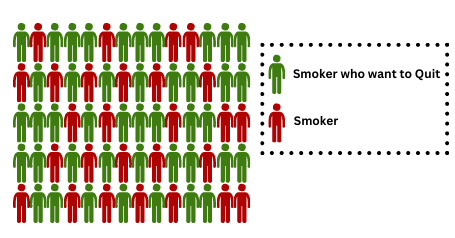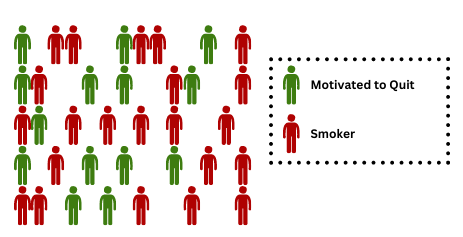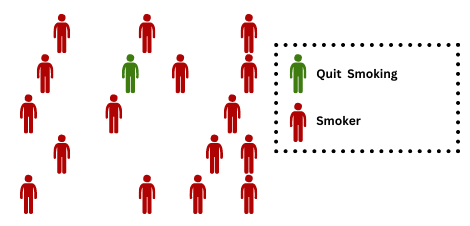Customized Counselling
The Science
Research shows that the best way for people to quit smoking is through evidence-based smoking cessation technologies and programs.
Such services include, among others, prescription drugs, insurance programs, nicotine over-the-counter products, and counseling.
Smokers who take part in cessation programs are more likely to successfully quit smoking, defined as abstinence for six months or more, than those who attempt quitting on their own.
Seventy percent of smokers who attempt to quit, do so without the use of evidence-based programs, and, among those, 90 percent will relapse.
Your Chances of Quitting increases with professional help

According to Statistics 70% smokers want to Quit.
A person won’t be able to avoid all of your triggers. And learning how to deal with triggers takes practice and patience. So, when a craving is triggered, it’s important to have a plan to beat that urge to smoke.

76% loose motivation within 7 days of Quitting without professional help.
With professional support, even though the person is older and has smoked for a long time, quitting is possible.
Customized counseling is an important and evident part of counseling as there is no one-size-fits-all method to quit smoking.

97% relapse/slip within 6 months without professional help.
Evidence-based tools created by various research agencies are used to help clients with a personalized quit experience.

Individual Counselling
Tobacco cessation program is a 12 weeks’ program which covers different aspects of the addiction. This plan is to ensure that the person not only quits but also maintains tobacco free lifestyle throughout. A key principle in doing so is by going into details of why he/she initiated the addictive nicotine in the first place by slowly dealing with the frequency of his/her tobacco usage. These sessions also introspect the person’s lives with his/her own reason of quitting. To ensure that there are minimal withdrawal symptoms, a plan on management of trigger factors is created.
A mutually discussed goal is is set and documented for quitting date and the preparations are made for the process.
Weekly plan mainly consists of:
Week 1: Nicotine Addiction Analysis Introspection on different spheres of life impacted
Week 2: Customized quit plan creation with trigger factor analysis
Week 3: Plan Optimization by Trigger factor management
Week 4: Risk Mitigation Withdrawal management
Week 5: onwards: Follow up Maintenance
The complete process is kept confidential.

Group Counselling
A group plan to ensure that the person not only quits but also maintains tobacco free lifestyle throughout. A key principle in doing so is by going into details of why he/she initiated the addictive nicotine in the first place by slowly dealing with the frequency of his/her tobacco usage.
The plan segregates people into groups based on their needs and willingness to quit:
- People who are willing to make the necessary commitment to quit
- Those who want help but are not willing to commit to a specialist course
- Those who want to stop but do not want professional support
After the segregation of groups customized support is provided to each group over the period of 12 weeks
The complete process is kept confidential.

Corporate Wellness
Any organization is the reflection of its people. Empowering its people to remove the deadly toxins will help them to stay active and fit during the call of duty.
These sessions will help them to understand various energy sources and manage their own pain/obstructions. This indeed would help in more productive office hours and contribute to the growth of the organization.
Customized plans can be created based upon your organizational needs such as a creating a tobacco-free campus.
